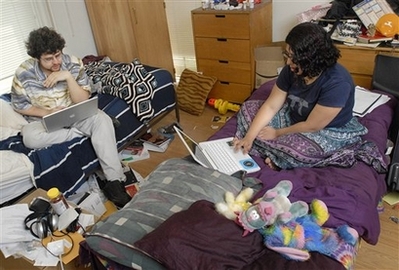Colleges are allowing coed dorm rooms
(Agencies)
Updated: 2008-05-04 13:13
Updated: 2008-05-04 13:13
Erik Youngdahl and Michelle Garcia share a dorm room at Connecticut's Wesleyan University. But they say there's no funny business going on. Really. They mean it.
They have set up their beds side-by-side like Lucy and Ricky in "I Love Lucy," and avert their eyes when one of them is changing clothes.
|
Roommates Erik Youngdahl, left, and Michelle Garcia surf the internet in their room in a house for students with an interest in Russian studies at Wesleyan University in Middletown, Conn., Thursday, April 24, 2008. Garcia and Youngdahl share a room because they realized they made the best fit compared to their other roommate options. At least two dozen schools now have policies that allow some or all students to share a room with whomever they choose. [Agencies] |
"People are shocked to hear that it's happening and even that it's possible," said Youngdahl, a 20-year-old sophomore. But "once you actually live in it, it doesn't actually turn into a big deal."
In the prim 1950s, college dorms were off-limits to members of the opposite sex. Then came the 1970s, when male and female students started crossing paths in coed dormitories. Now, to the astonishment of some Baby Boomer parents, a growing number of colleges are going even further: coed rooms.
At least two dozen schools, including Brown University, the University of Pennsylvania, Oberlin College, Clark University and the California Institute of Technology, allow some or all students to share a room with anyone they choose — including someone of the opposite sex. This spring, as students sign up for next year's room, more schools are following suit, including Stanford University.
As shocking as it sounds to some parents, some students and schools say it's not about sex.
Instead, they say the demand is mostly from heterosexual students who want to live with close friends who happen to be of the opposite sex. Some gay students who feel more comfortable rooming with someone of the opposite sex are also taking advantage of the option.
"It ultimately comes down to finding someone that you feel is compatible with you," said Jeffrey Chang, a junior at Clark in Worcester, Mass., who co-founded the National Student Genderblind Campaign, a group that is pushing for gender-neutral housing. "Students aren't doing this to make a point. They're not doing this to upset their parents. It's really for practical reasons."
Couples do sometimes room together, an arrangement known at some schools as "roomcest." Brown explicitly discourages couples from living together on campus, be they gay or straight. But the University of California, Riverside has never had a problem with a roommate couple breaking up midyear, said James C. Smith, assistant director for residence life.
Most schools introduced the couples option in the past three or four years. So far, relatively few students are taking part. At the University of Pennsylvania, which began offering coed rooms in 2005, about 120 out of 10,400 students took advantage of the option this year.
At UC Riverside, which has approximately 6,000 students in campus housing, about 50 have roommates of the opposite sex. The school has had the option since 2005.
Garcia and Youngdahl live in a house for students with an interest in Russian studies. They said they were already friendly, and didn't think they would be compatible with some of the other people in the house.
"I had just roomed with a boy. I was under the impression at the time that girls were a little bit neater and more quiet," Youngdahl said. "As it turns out, I don't see much of a difference from one sex to the other."
Garcia, 19, admitted: "I'm incredibly messy."
Parents aren't necessarily thrilled with boy-girl housing.
Debbie Feldman's 20-year-old daughter, Samantha, is a sophomore at Oberlin in Ohio and plans to room with her platonic friend Grey Caspro, a straight guy, next year. Feldman said she was shocked when her daughter told her.
"When you have a male and female sharing such close quarters, I think it's somewhat delusional to think there won't be sexual tension," the 52-year-old Feldman said. "Maybe this generation feels more comfortable walking around in their underwear. I'm not sure that's a good thing."
Still, Feldman said her daughter is partly in college to learn life lessons, and it's her decision. Samantha said she assured her mom she thinks of Caspro as a brother.
"I'm really close to him, and I consider him one of my really good friends," she said. "I really trust him. That trust makes it work."
|
||
|
||
|
|
|
|
